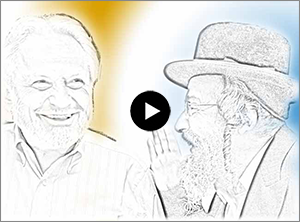What the Jewish People Believe In
I start this article in December 2013, and I know in advance that it is going to take me a long time. Many people come to my site searching for “Jewish Beliefs”, and it’s time that I give you what you are looking for. If you are visiting this site still in 2013 or in the beginning of 2014, please realize that this article is probably still in the developmental stage.
Table of Contents:
Is there a creed in Judaism?
About G-d
About Prophecy
About Torah
About Reward and Punishment
About the Afterlife
About Israel
What They Say
I did a search on Jewish Beliefs to see what is coming up in the “Google Top Ten”, and indeed I was overwhelmed at what’s being written. Amongst the various sites I see a consensus that there is no real creed that one has to believe in in order to be a good Jew, the main thing is what you do, the actions, not the beliefs. There is system written by the Rambam, they say, of the 13 principles of faith, but it is very general, and it is not really binding, they claim, or that it is disputed, not accepted.
The 13 Principles of the Rambam concern themselves with what is G-d, Prophecy, what is Torah (the Jewish Bible so to speak, the Five books of Moses), Reward and Punishment, Messiah, and the Resurrection.
Since this is all very misleading and inaccurate, with your permission I will give my own take on Jewish beliefs.
Do the Jews Have to Believe In Anything?
First to preface:
If you want to perform a “commandment”, then there perforce has to be a Commander or it makes no sense. You can’t have a Commandment without a Commander — The Creator, who is Almighty, One, Perfect, etc.
Unless you believe that G-d doesn’t demand that we do anything, just gives us good advice what He thinks would be a good practice, but nothing is obligatory. But this is inconsistent with Jewish heritage, and is one of the heretical positions which was held in Ancient Egypt, and was put to rest (as false) when G-d took the Jewish people out of Egypt with plagues and wonders. I will expand on this later.
The holy Ohr HaChaim writes in the Parsha of Ki Tavo (on the verse VeSamtah Bateneh) that a person can do all of the good deeds, but if they are not done in line with what the Talmudic Sages delineated regarding the performance of the commandments, then both he and his good deeds will be burnt up.
It is clear that Jewish Tradition and Jewish Law demand an obligatory creed of beliefs from the Rambam that everyone quotes, the Rambam’s 13 Principles of Faith.
In the Rambam’s commentary on the Mishna, there are a few places where he “goes to town”, lengthens his words, in order to bring out properly that which he wants to explain. One of those places is in the Tractate Sanhedrin, the tractate that deals with the system of courts and punishments which are given out by the courts.
There in the 10th or 11th chapter, the chapter called “khelek”, or “Chelek”, the Mishna starts out by saying “All of Israel have a share in the world to come”, and then afterwards says, “and these are those (Jewish people) that don’t have a share in the world to come…” and lists a few of the sins for which a person can lose his share in the afterlife.
Now, first of all, the Rambam explains what in the world is indeed the “world to come”, this is one of the reasons that he lengthens his words. This is a point about which the Rishonim, the medieval commentators, dispute one another. The Rambam brings a few of these commentaries.
But focusing on the “Principles of Faith”, one of the sins that the Mishna mentions for which a person loses his portion in the world to come, is to be an “Apikorus”. The Reshonim, the medieval commentators, understand that this includes rejecting certain basic tenets of Judaism.
Now, the truth is that I can stop right here, for it is explicit in the Mishna itself, the Talmud, that there is a basic creed which is incumbent upon every Jew to believe. For otherwise he is an apikorus, loses his association with the Jewish people, and loses his share in the afterlife.
But the Rambam there on this Mishna, explains the 13 tenets that if a person rejects any of them, then, (what I understand to be the simple reading of the Rambam, and actually the Rambam himself spells this out explicitly afterwards), is included in “Apikorus” for which a person loses his share in the afterlife.
Rav Yosef Albo in his Sefer HaIkarim, raises difficuties with the Rambam’s approach, argues with him, and comes up with a different definition of the basic creed which is incumbent on every Jew, the rejection of which places a person as an Apikorus mentioned there in the Mishna.
Therefore to present the Sefer HaIkarim as an authority who rejected the Rambam’s principles without explaining further, in order to imply that even this creed that the Rambam sets forth in his 13 Principles is rejected by the Sefer HaIkarim, in order to strengthen the author’s position that there is no real creed that a Jew has to believe in, “the main thing is what you do, not what you believe”, is a misrepresentation of the facts and is incorrect. The Sefer HaIkarim is also discussing that very same Mishna, what are the creeds that if one rejects them will constitute being an Apikorus and will lose his share in the world to come.
*** Jewish Beliefs Course Straight To Your Inbox ***




